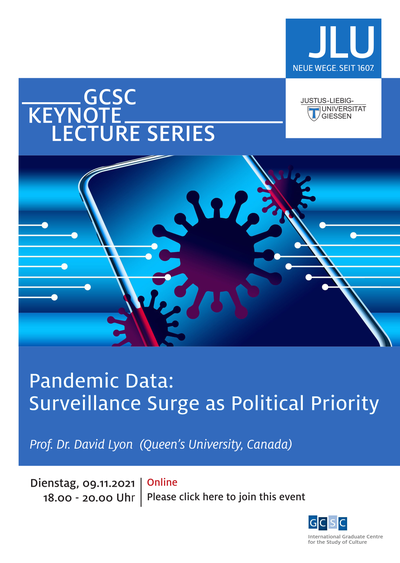WiSe 2021/22: The Role of the Digital in the Study of Culture. New Horizons, Potentials, Challenges
David Lyon (Queen's University, Canada)
Pandemic Data: Surveillance Surge as Political Priority
09.11.2021, 18-20 (CET), online
The COVID-19 pandemic is both the most extensive—global—pandemic, prompting an unprecedented surveillance surge, comparable to post-9/11, but far larger. Some pandemic efforts are treated as “national security” matters. A collusion occurred of public health surveillance and a parallel expansion of surveillance centred on the domestic sphere. Remotely conducted activities such as shopping, learning and working all enjoy enhanced surveillance capacities. So “state” surveillance is significant, but also, “corporate” surveillance mushrooms with the two often working in tandem, through public-private agreements. Questions are raised about some public health surveillance such as contact-tracing and vaccination certificates, but few about the overall surveillance surge. If the increased surveillance remains in place as the pandemic subsides, this poses major political challenges. As well as indicating an urgent need to update already existing legal and regulatory instruments, a broader response is also required, to raise the profile of “data justice.” This points not only to the notion that “privacy” might be violated or “data protection” impugned, but that a more universal challenge has surfaced. As surveillance data is the means whereby people are made visible, represented and treated, “data justice” is a new political priority, to ensure fair treatment for all in an increasingly digital culture.
Astrid Ensslin (University of Bergen, Norway)
Literary Gaming: Digital Culture Between Narrative Play and Electronic Literature
16.11.2021, 18-20 (CET), online
In this lecture, I introduce the concept of literary gaming as a way of understanding the hybrid media ecologies between lucidity (playfulness), narrativity and poetic expression in contemporary digital culture. Taking an aesthetic approach, I demonstrate how literary expression in digital-born media exceeds and subverts traditional notions of literature. Looking at examples of digital poetry and fiction, literary-narrative games and virtual reality installations, I showcase how concepts of worlding, multimodality, and procedurality open up entirely new hermeneutic, phenomenological and critical paradigms that require new, transdisciplinary research agendas for analyzing, understanding and co-creating these complex works, and for exploring how they can help us address real-world questions and challenges.
Marcello Vitali-Rosati (University of Montréal, Canada)
The Factory of Thinking: Protocols, Algorithms, Formats, and Worldviews
18.01.2022, 18-20 (CET), online
For some years now, there has been talk of a "new materialism". Criticizing the idea of metaphysics of Aristotelian origin which opposes form to matter, this current - if it is one - tries to return to the materiality of thinking: there is no form without matter, matter makes form, or even better, matter is form. To say it with Karen Barad: "matter matters". This means in particular that text is also always an inscribed text. A certain ideality of the notion of text such as it has circulated in the post-structuralist tradition is thus put to shame. Thinking is always an inscription, a text is always an inscription. And thus there are no neutral tools in the hands of a thinking mind, tools, protocols, formats... are thinking. Protocols, algorithms, formats think. How do they think? What do they think? Based in particular on the example of textual writing formats, I will try to show this fusion between technique and thinking and its cultural and political consequences. In particular I will analyze the format docx and the implications of writing with Microsoft Word, and I will present the text editor Stylo which was created in order to propose an alternative way of writing in the field of Human and Social sciences.
Peter Haslinger (Herder Institute for Historical Research on East Central Europe, Germany)
Memory Politics in the Digital Age
08.02.2022, 18-20 (CET), online
Digital communication and the digital representation of the past are obviously closely related to memory cultures, and by that also memory politics. However, we still need a model that systematically captures this complex and multi-layered interrelationship. Also, the digital revolution raises a lot of new questions about the futures of historical knowledge and – given the political development in countries like Russia or China – especially of memory politics. The aim of the presention is therefore to give an impulse for the development of a new conceptional approach for future research. It will start with the critical potential of Digital humanities approaches when it comes to analyzing current trends in memory politics, especially in the form of populisms from above. It will then take a look at examples from Eastern Europe to address the intersection between memory politics and digital knowledge spaces and media systems. From that point of view it will in the end shed some light on how digital communication might pro-actively help to foster a digital knowledge environment that is based on multiperspectvity and a critical and ethical approach to memory cultures.




